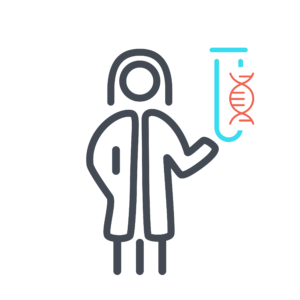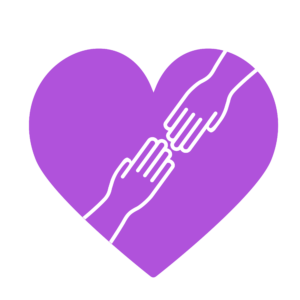AFF2-Related Syndrome

Table of contents
- What is AFF2-related syndrome?
- Key Role
- Symptoms
- What causes AFF2-related syndrome?
- Why does my child or I have a change in the AFF2 gene?
- What are the chances that other family members of future children will have AFF2-related syndrome?
- How many people have AFF2-related syndrome?
- Do people who have AFF2-related syndrome look different?
- How is AFF2-related syndrome treated?
- Behavior and development concerns linked to AFF2-related syndrome
- Where can I find support and resources?
- Sources and References
AFF2-related syndrome is also called FMR2 or FRAXE. For this webpage, we will be using the name AFF2-related syndrome to encompass the wide range of variants observed in the people identified.
What is AFF2-related syndrome?
AFF2-related syndrome happens when there are changes to the AFF2 gene. These changes can keep the gene from working as it should. The AFF2 gene is located on the X chromosome and only males carrying the genetic variation are affected with the condition.

Key Role
The AFF2 gene plays a key role in brain development.
Symptoms
Because the AFF2 gene is important in the development and function of brain cells, many people who have AFF2-related syndrome have:
- Intellectual disability
- Developmental and speech delays
- Autism or features of autism
- Hyperactivity and attention difficulties
- Behavior issues, such as aggression, impulsivity, and obsessive compulsive disorder
What causes AFF2-related syndrome?
AFF2-related syndrome is a genetic condition, which means that it is caused by variants in genes. Our genes contain the instructions, or code, that tell our cells how to grow, develop, and work. Genes are arranged in structures in our cells called chromosomes. Chromosomes and genes usually come in pairs, with one copy from the mother, from the egg, and one copy from the father, from the sperm.
We each have 23 pairs of chromosomes. One pair, called the X and Y chromosomes, differs between biological males and biological females. Biological females have two copies of the X chromosome and all its genes, one inherited from their mother and one inherited from their father. Biological males have one copy of the X chromosome and all its genes, inherited from their mother, and one copy of the Y chromosome and its genes, inherited from their father.
In most cases, parents pass on exact copies of the gene to their child. But the process of making the sperm and egg is not perfect. A variant in the genetic code can lead to physical issues, developmental issues, or both.
The AFF2 gene is located on the X chromosome, so variants in this gene can affect biological males and biological females in different ways. Biological males who have variants in this gene will likely have AFF2-related syndrome.
Biological females who have variants in this gene may or may not have symptoms of AFF2-related syndrome. Biological females who have one working copy of the gene and one non-working copy are considered to be ‘carriers’. Even if a biological female does not have signs or symptoms of the syndrome, they can pass it along to their children.
X-linked recessive conditions
Research shows that AFF2-related syndrome is often the result of an inherited variant in GENE. This means that AFF2-related syndrome happens because the genetic variant was passed down from a biological female parent. Biological females that carry the AFF2 variant usually do not have symptoms, but sometimes they might.
Sometimes it results from a spontaneous variant in the AFF2 gene in the sperm or egg during development. When a brand new genetic variant happens in the genetic code is called a ‘de novo’ genetic variant. The child can be the first in the family to have the gene variant.
X-Linked Recessive Genetic Syndrome
Why does my child or I have a change in the AFF2 gene?
No parent causes their child’s AFF2-related syndrome. We know this because no parent has any control over the gene changes that they do or do not pass on to their children. Please keep in mind that nothing a parent does before or during the pregnancy causes this to happen. The gene change takes place on its own and cannot be predicted or stopped.
What are the chances that other family members of future children will have AFF2-related syndrome?
Each family is different. A geneticist or genetic counselor can give you advice on the chance that this will happen again in your family.
The risk of having another child who has AFF2-related syndrome depends on the genes of both biological parents.
- Biological females who have a variant in the AFF2 gene and are pregnant with a daughter have a 50 percent chance of passing on the same genetic variant and a 50 percent chance of passing on the working copy of the gene.
- If they are pregnant with a son, the child has a 50 percent chance of inheriting the genetic variant and the syndrome.
For a symptom-free brother or sister of someone who has AFF2-related syndrome, the sibling’s risk of having a child who has AFF2-related syndrome depends on the sibling’s genes and their parents’ genes.
- If neither parent has the same genetic variant causing AFF2-related syndrome, the symptom-free sibling has a nearly 0 percent chance of having a child who would inherit AFF2-related syndrome.
- If the biological mother has the same genetic variant causing AFF2-related syndrome, and the symptom-free daughter has the variant, the symptom-free daughter’s chance of having a son who has AFF2-related syndrome is 50 percent.
For a person who has AFF2-related syndrome, the risk of having a child who has the syndrome is about 50 percent.

How many people have AFF2-related syndrome?
Researchers estimate that about 1 in 25,000 to 1 in 100,000 newborn males have AFF2-related syndrome. There are likely many more undiagnosed people who have the syndrome. As of 2024, doctors had described over 50 people in the world with changes in the AFF2 gene. The first case of AFF2-related syndrome was described in 1993. Scientists expect to find more people who have the syndrome as access to genetic testing improves.

Do people who have AFF2-related syndrome look different?
People who have AFF2-related syndrome typically do not look different from others.

How is AFF2-related syndrome treated?
Scientists and doctors have only just begun to study AFF2-related syndrome. At this point, there are no medicines designed to treat the syndrome. A genetic diagnosis can help people decide on the best way to track the condition and manage therapies. Doctors can refer people to specialists for:
- Physical exams and brain studies
- Genetics consults
- Development and behavior studies
- Other issues, as needed
A developmental pediatrician, neurologist, or psychologist can follow progress over time and can help:
- Suggest the right therapies. This can include physical, occupational, speech, or behavioral therapy.
- Guide individualized education plans (IEPs).
Specialists advise that therapies for AFF2-related syndrome should begin as early as possible, ideally before a child begins school.
If seizures happen, consult a neurologist. There are many types of seizures, and not all types are easy to spot. To learn more, you can refer to resources such as the Epilepsy Foundation’s website: epilepsy.com/learn/types-seizures.

This section includes a summary of information from major published articles. It highlights how many people have different symptoms. To learn more about the articles, see the Sources and references section of this guide.
Behavior and development concerns linked to AFF2-related syndrome
Learning
Most people have some degree of intellectual disability and learning difficulties. Some people with AFF2-related syndrome have seizures.
- 33 out of 44 people have intellectual disability and learning difficulties (75 percent).
- 17 out of 49 have seizures (35 percent).

Speech
Many have language difficulties.
Behavior
Many people have autism or show features of autism, such as social difficulties, excessive hand flapping, and restricted interests. Many also have attention difficulties, hyperactivity, and impulsivity.
- 12 out of 44 people with AFF2-related syndrome have autism or show features of autism (27 percent).

Where can I find support and resources?
Simons Searchlight
Simons Searchlight is an online international research program, building an ever growing natural history database, biorepository, and resource network of over 175 rare genetic neurodevelopmental disorders. By joining their community and sharing your experiences, you contribute to a growing database used by scientists worldwide to advance the understanding of your genetic condition. Through online surveys and optional blood sample collection, they gather valuable information to improve lives and drive scientific progress. Families like yours are the key to making meaningful progress. To register for Simons Searchlight, go to the Simons Searchlight website at www.simonssearchlight.org and click “Join Us.”
- Learn more about Simons Searchlight: www.simonssearchlight.org/frequently-asked-questions
- Simons Searchlight webpage with more information on AFF2: www.simonssearchlight.org/research/what-we-study/aff2
- Simons Searchlight Facebook group: www.facebook.com/groups/2330706373860379

Sources and References
The content in this guide comes from published studies about AFF2-related syndrome. Below you can find details about each study, as well as links to summaries.
- Knight SJ. et al. Cell, 74, 127-134, (1993). Trinucleotide repeat amplification and hypermethylation of a CpG island in FRAXE mental retardation www.ncbi.nlm.nih.gov/pubmed/8334699
- Abrams MT. et al. American Journal of Medical Genetics, 74, 73-81, (1997). Cognitive, behavioral, and neuroanatomical assessment of two unrelated male children expressing FRAXE www.ncbi.nlm.nih.gov/pubmed/9034011
- Stettner GM. et al. American Journal of Medical Genetics Part A, 155A, 2003-2007, (2011). Familial intellectual disability and autistic behavior caused by a small FMR2 gene deletion www.ncbi.nlm.nih.gov/pubmed/21739600
- Correia F. et al. Journal of Autism and Developmental Disorders, 45, 888-892, (2015). Autism spectrum disorder: FRAXE mutation, a rare etiology www.ncbi.nlm.nih.gov/pubmed/25035088
- Zou D, Qin B, Wang J, et al. AFF2 Is Associated With X-Linked Partial (Focal) Epilepsy With Antecedent Febrile Seizures. Front Mol Neurosci. 2022;15:795840. Published 2022 Mar 30. https://pubmed.ncbi.nlm.nih.gov/35431806/
